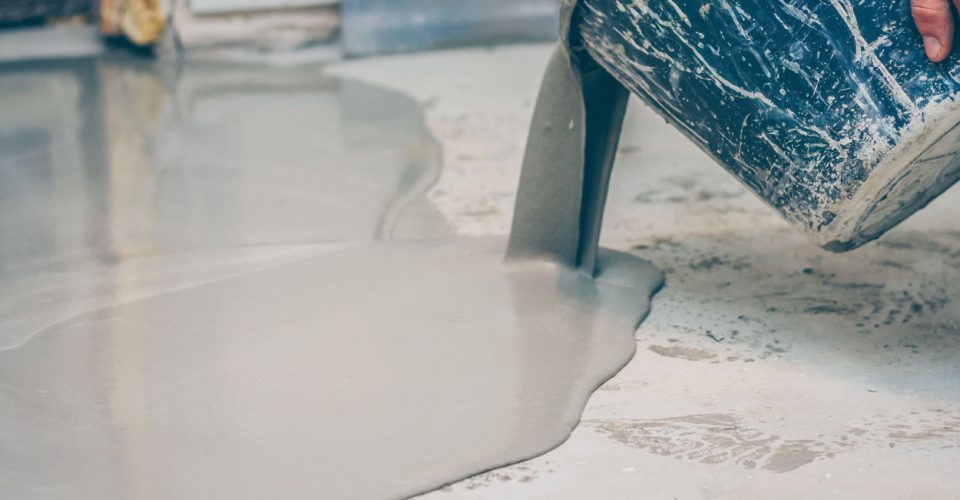Difference Between Liquid Floor Screed And Concrete Flooring
When it comes to flooring options, it’s essential to choose the right materials to ensure durability, longevity, and performance. Two common choices for flooring are liquid floor screed and concrete.
Both materials serve as a foundation for a finished floor, but they have distinct differences that impact their suitability for various applications.
In this article, we will explore the disparities between liquid floor screed and concrete, helping you make an informed decision for your flooring needs.

Liquid Floor Screed: A Modern Flooring Solution
Liquid floor screed, often referred to as flow screed or just screed, is a relatively modern flooring solution that offers several advantages over traditional concrete. Liquid floor screed is a mixture of water, sand, and cement, which results in a flowing, self-leveling compound. This composition allows for easy and quick installation, making it an ideal choice for both residential and commercial projects.
Advantages of Liquid Floor Screed:
Efficiency and Speed:
Liquid floor screed can be poured and spread quickly, reducing labour costs and project completion times. It flows into every corner and crevice, providing a level surface with minimal effort.
Self-Leveling:
One of the primary benefits of liquid screed is its self-leveling property. It automatically settles into a level surface, eliminating the need for extensive manual levelling and troweling.
Improved Heat Conductivity:
Liquid screed is an excellent choice for underfloor heating systems. Its self-leveling properties ensure that the heating pipes or cables are evenly distributed throughout the floor, optimising heat conductivity and energy efficiency.
Reduced Cracking:
Liquid floor screed is less prone to cracking compared to traditional concrete. This is because it doesn’t require expansion joints as frequently, resulting in a smoother and more durable surface.
Enhanced Finish:
Liquid screed provides a smooth and even surface, making it an ideal choice for the application of a wide range of finishes, such as tiles, wood, or laminate.
Thinner Application:
Liquid screed can be applied in thinner layers than concrete, reducing the overall weight of the floor structure and the amount of material required.
Using Screed Professionals
Whether you’re looking to use liquid screed in London, Liverpool or anywhere else in the UK, we would always recommend contracting professionals to do the job. There are specialists locally across the UK and finding the perfect screed company near you won’t be difficult.
Concrete: The Traditional Choice
Concrete has been a tried-and-tested construction material for centuries. It is composed of cement, water, and aggregates like sand and gravel. Concrete is renowned for its strength and durability, making it suitable for various applications, from sidewalks and driveways to flooring and foundations.
Advantages of Concrete Flooring:
Durability:
Concrete flooring is known for its exceptional durability, capable of withstanding heavy traffic, abrasion, and harsh environmental conditions.
Versatility:
It can be customised in terms of colour, texture, and finish, allowing for a wide range of design possibilities.
Longevity:
Well-maintained concrete floors can last for decades, making them a cost-effective option in the long run.
Cost-Effective for Large Areas:
When dealing with vast areas, such as foundations, concrete is often more cost-effective due to its high strength and longevity.
Traditional Aesthetic:
Concrete offers a classic and timeless aesthetic, which is appealing to many.
Comparing Liquid Floor Screed and Concrete Flooring
Now that we’ve explored the individual characteristics of liquid floor screed and concrete, let’s make a side-by-side comparison to help you understand the differences between these two flooring options more clearly.
Installation Process
- Liquid Floor Screed: Quick and efficient installation with self-levelling properties.
- Concrete: Requires more time for curing and manual levelling.
Application Thickness
- Liquid Floor Screed: Can be applied in thinner layers.
- Concrete: Requires thicker layers for structural integrity.
Underfloor Heating:
- Liquid Floor Screed: Ideal for underfloor heating systems due to even heat distribution.
- Concrete: Can be used with underfloor heating, but the heat distribution may not be as uniform.
Finish Options:
- Liquid Floor Screed: Suitable for a wide range of finishes, including tiles, wood, and laminate.
- Concrete: Offers customisation in terms of colour, texture, and finish.
Cracking:
- Liquid Floor Screed: Less prone to cracking due to reduced need for expansion joints.
- Concrete: May develop cracks over time, requiring regular maintenance.
Strength and Durability:
- Liquid Floor Screed: Adequate for most residential and commercial applications.
- Concrete: Exceptionally strong and durable, suitable for heavy industrial use.
Cost:
- Liquid Floor Screed: Generally more cost-effective for smaller projects.
- Concrete: Cost-effective for large areas and long-term durability.
Conclusion:
The choice between liquid floor screed and concrete largely depends on the specific requirements of your flooring project. Liquid screed offers efficiency, and self-levelling properties, and is an excellent choice for underfloor heating systems, making it a top choice for many projects.
On the other hand, concrete remains a classic and durable option, ideal for high-traffic areas and industrial applications. When opting for concrete, choosing the right screed company is crucial to ensure the quality and longevity of the flooring.
Regardless of which you choose, always ensure you use a professional contractor wherever you are, whether that be a ready-mix supplier or your local flow screed services

